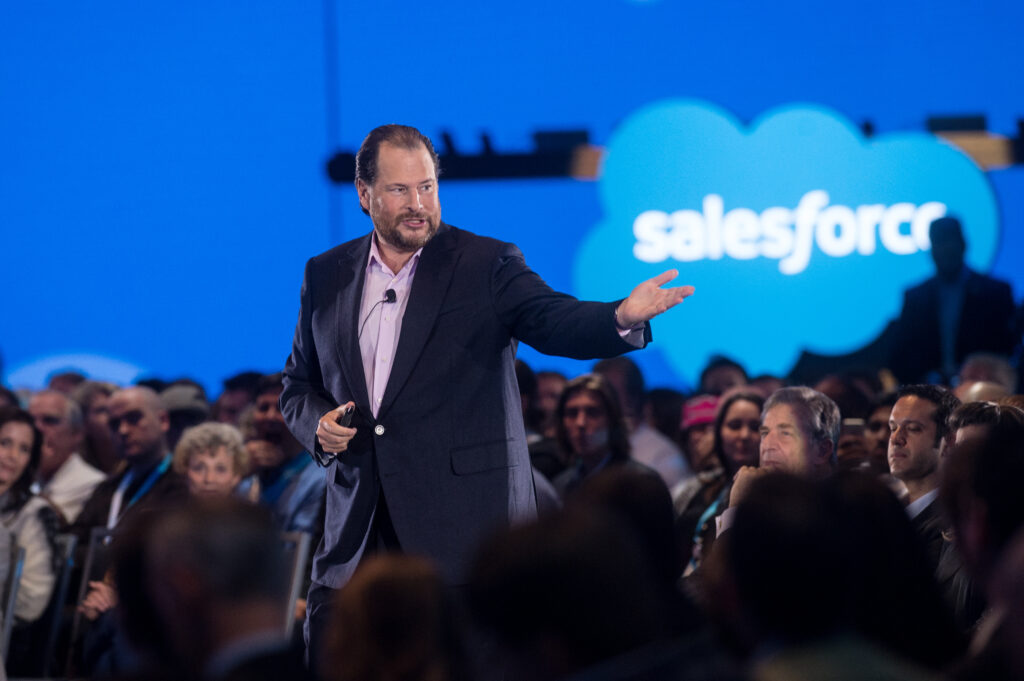Salesforce has beaten revenue guidance for its first quarter fiscal 2024 ended April 30, 2023, with steadied growth and higher capital costs causing surging shares to drop seven percent after hours.
Total first quarter revenue was $8.25bn, an increase of 11 percent year-on-year (YoY) and 13 percent constant currency, topping the $8.18bn expected by analysts and delivering on Benioff’s promise of profitability.
Driving the growth, annual recurring revenue (ARR) grew above 50 percent for eight of Salesforce’s industry clouds, while sales performance management, sales productivity and digital service product segments, all delivered ARR above 40 percent in the quarter.
However, the total growth represents the slowest for the firm in over a decade, with the reduced pace attributed to longer deal cycles and deal compression in the US markets and particularly in the professional services segment, prompted in part by the uncertain macro environment.
Subscription and support revenues were $7.64bn, an increase of 11 percent YoY, while professional services and other revenues were $0.61bn, an increase of nine percent YoY.
Capital expenditure rose for the quarter totaling $243m, a 36 percent increase compared to the previous period, due to Salesforce’s investment in Einstein GPT and a wider generative AI ecosystem.
First quarter GAAP operating margin was 5.0 percent, with non-GAAP operating margin being 27.6 percent, compared to its fiscal 2023 GAAP operating margin at 3.3 percent and non-GAAP at 22.5 percent, and progressing the firm closer to its 30 percent target in Q1 2025.
Additionally, the company returned $2.1bn in Q1 to stockholders in the form of share repurchases, which brings the total returned to more than $6bn since the program was launched last August, which represents more than 38 million shares.
In an earnings call, the company estimated Q2 revenue to be in the range of $8.51bn-$8.53bn, a growth of approximately ten percent in both nominal and constant currency and topping analyst estimates of $8.49bn.
Brian Millham, president and COO, Salesforce, said: “Our productivity is up, profitability is up, revenue is up, cash flow is up. We’re increasing our margin guidance. And Salesforce is leading the way as the No.1 AI CRM. But we’re still operating in an uncertain macro environment. Customers continue to scrutinize every deal and we see elongated deal cycles and deal compression.
“In Q1, our professional service business started to see less demand for multiyear transformations, and, in some cases, delayed projects as customers focused on quick wins and fast time-to-value. We saw strong performance from some of our fast time-to-value efficiency-focused products with sales performance management, sales productivity, and digital service.”
Marc Benioff, chair and CEO of Salesforce, said: “We’re maintaining our fiscal year ’24 revenue guidance of approximately 34.5bn-34.7bn, over ten percent projected growth YoY. I couldn’t be more proud of how our team has come together, stepped up, and delivered these results. At the same time, we are leading the next major revolution in CRM – infusing trusted, secure generative AI across our entire product portfolio. Salesforce’s generative AI ecosystem wields Einstein GPT, Slack GPT, and Tableau GPT, delivering trusted power across our product portfolio.”



